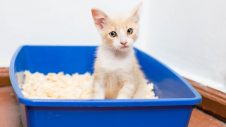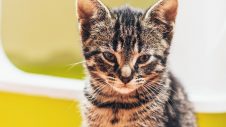What is spraying?
Urine spraying is part of a cat’s normal scent-marking behaviour. Your cat sprays to ‘mark out’ their territory, warning other cats not to intrude. Spraying also attracts females in season. When spraying, a cat stands with their tail vertical (often quivering at the tip) while they deliver a squirt of urine backwards onto a vertical surface. Cats may spray when frustrated, upset or challenged. The more anxious the individual, the more they produce familiar odours for comfort.
Who sprays?
All cats, male or female, desexed or not, may spray. Nondesexed Toms and Queens in season will spray more.
Why do cats spray indoors?
Most desexed pets feel relaxed in their own homes and do not spray. Most will only mark their territory by rubbing scent from their body. These scents are called pheromones which make them feel more relaxed and at home. Urine spraying is usually a cats’ response to an anxious situation. This could include living in a multi-cat household, in a neighbourhood with many cats, moving to a new home, separation for long periods from the owner or a change from being an outdoor to an indoor cat.
Diagnosis
To rule out underlying medical causes for your cat’s spraying, a veterinary examination is recommended. Your vet will also be able to advise you on how best to discourage the behaviour if no medical reason is apparent.
Treatment
- desexing significantly reduces spraying, but about 5% of desexed females and 10% of desexed males will still spray
- treat underlying medical causes
- identify and remove any perceived threat or source of stress to your cat. Make them feel more secure in their home territory.
- never punish your cat as this is only likely to raise their anxiety.
- placing food or a bed at the base of the spraying sites is often helpful at protecting those particular areas
- spraying can be triggered by the smell of previous marks, so marked areas should be thoroughly cleaned (do not use ammonia-based agents, as these mimic the smell of urine pheromones)
- use Feliway pheromone products. Pheromones are chemical substances secreted by animals to confirm their territory and to communicate with others. Cats usually use facial pheromones by rubbing objects with the side of the face. Facial pheromones will inhibit urinary marking when applied to an area. Feliway is an analogue of feline facial pheromones
- Clomicalm is a tablet given once daily. It’s a drug which reduces the animals level of anxiety so that in conjunction with behaviour modification techniques, will eliminate urine spraying
Speak with your local Greencross Vets about the best treatment options for your cat’s spraying.

 Greencross Vets
Greencross Vets 




